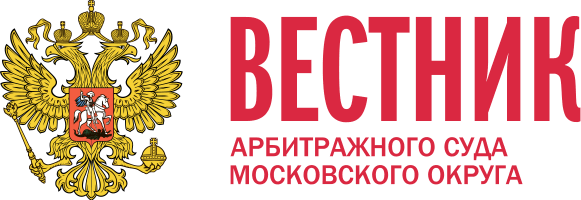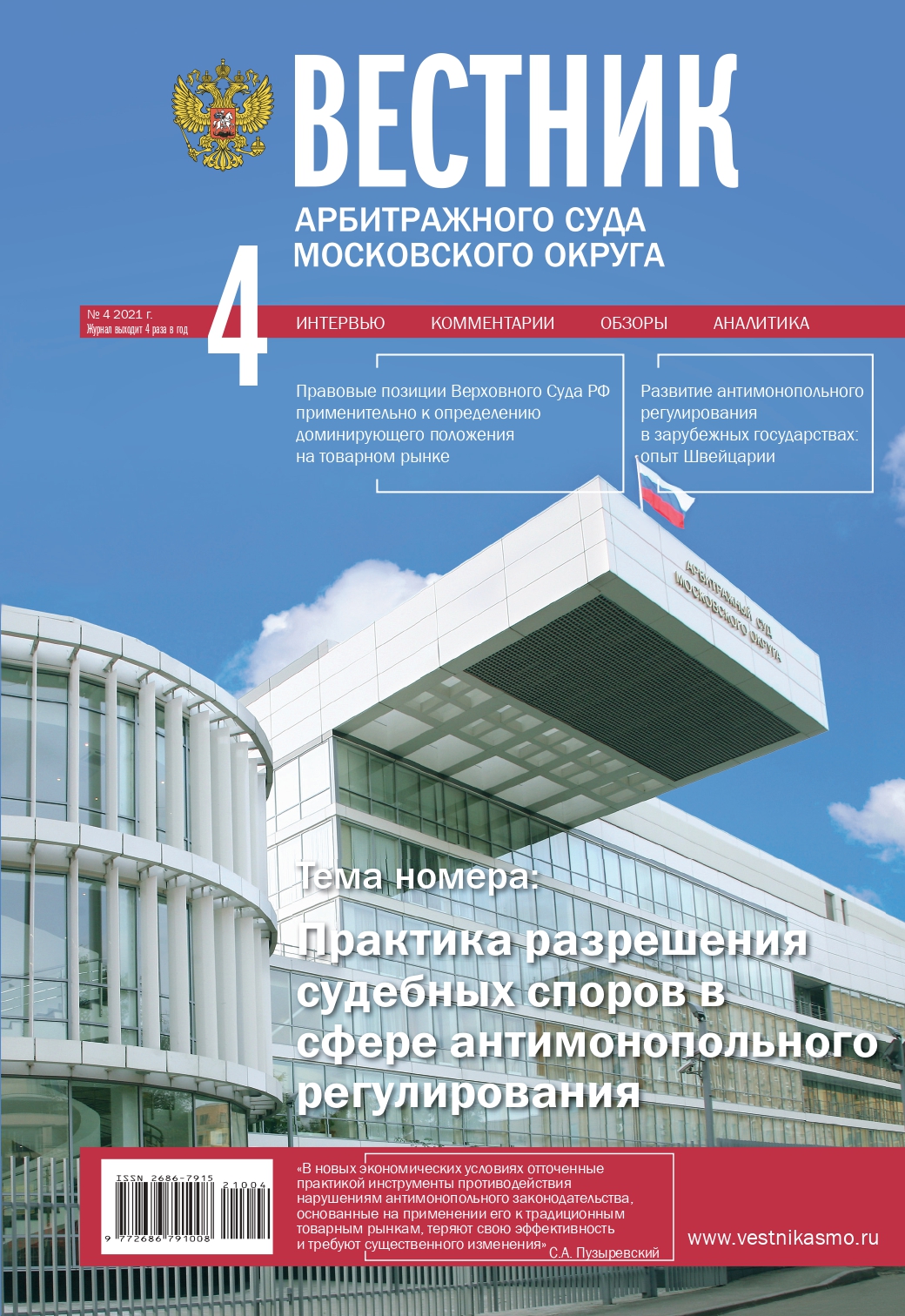Courts News
News of Moscow District Courts
Interview of the issue
Puzyrevskiy S.A. “In the new economic environment, the tools to counter infringements of competition law that have been established in practice on the basis of their application to traditional product markets, are losing their effectiveness and need to be substantially changed”
Topicality
Standards of Proof for Antitrust Violations
Analytics: Litigation Practice in the Field of Antitrust Regulation
E.S. Khokhlov
Legal Positions of the Supreme Court of the Russian Federation in Respect of the Definition of a Dominant Position in a Market
The article analyses legal positions adopted by the Supreme Court of the Russian Federation in the Resolution of the Plenum No. 2 dated 4 March 2021 “On Certain Questions Arising in Connection with the Application by the Courts of the Antimonopoly Legislation” in part related to the definition of a dominant position of an undertaking in a market. Described are the legal positions related to the issues of the criteria of a dominant position, individual and collective dominance, specifics of determining a dominant position with the participation of a group of persons.
Keywords: dominant position, individual dominance, collective dominance, group of persons
DOI: 10.46279/ASMO.2021.15.43.001
A.A. Solovyov
Development of Antitrust Regulation in Foreign Countries: The Swiss Experience
The author studies the legal regulation of antitrust activity in the Swiss Confederation. In particular, current legislation on the protection of competition and the relevant provisions of the Federal Constitution are analysed. Besides, two main normative legal acts in this field are described: these are Federal Laws ‘On Cartels and Other Restrictions on Competition’ and ‘On Prevention of Unfair Competition”. The author also examine the evolution of Swiss competition law from the end of the XIX century to the present day. Special attention is paid to the basics of the legal status of the Competition Commission.
Keywords: antitrust law, foreign experience, Swiss Confederation, competition, competition law, Competition Commission
DOI: 10.46279/ASMO.2021.29.62.002
Analytics: Open Tribune
M.I. Krasheninnikova
Choice of law in cloud computing relations.
Abstract: Today, the use of cloud technologies is becoming improbably relevant towards the development of entrepreneurial activities and cost reduction. In response to the world cloud computing technologies market development, many new legal issues arise, both in substantive and procedural law. This article is devoted to the applicable law determination issues in cloud computing relations. Particular attention is paid to contractual relations assisted by consumer. Weak party (both active and passive) participation presupposes the most beneficial lex electa mandatory rules application. On the basis of foreign practice, the author identified the major worldwide concept of determining the passive consumers — the theory of targeted (directed) activity, which allows to localize the legal relationship on Internet based contracts.
Keywords: Сloud computing technologies, choice of law, conflicts of law rule, characteristic performance, theory of targeted (directed) activity
DOI: 10.46279/ASMO.2021.85.79.003
V.P. Sorokin
The Legal Nature of Arbitral Awards Adopted in the Russian Federation
In the doctrine of legal procedure there is a debate both over the legal nature of arbitral awards as a determination on the merits, and on the essence of the settlement agreement approved by the arbitration court. The author compares certain provisions of foreign legislation concerning problems of amicable settlement with similar provisions of domestic law. The article may be of interest for specialists in the field of procedural law both in theoretical and practical aspects.
Keywords: arbitration, arbitration proceedings, legal nature of arbitration acts, arbitral award, award and ruling of arbitration court, termination of arbitration, amicable settlement agreement
DOI: 10.46279/ASMO.2021.37.76.004
E.A. Ruzhenkova
Limits to the Legal Qualification of Substantive Claims by the Court (On the Boundaries of the Dispositive Principle in Civil Litigation)
Determining the subject matter and cause of action is traditionally regarded as a dispositive right of the parties in civil and commercial proceedings. At the same time the choice of an improper way to protect one’s right often becomes the reason for the refusal to satisfy the claims. The present research attempts to define the limits of the court’s powers to reclassify the claims initially asserted by the litigants. The author concludes that such recharacterisation is admissible in principle and suggests criteria for determining its limits.
Keywords: principle of optionality, adversarial principle, subjective interest in law, change in the subject or cause of action, legal qualification of substantive legal claims
DOI: 10.46279/ASMO.2021.89.35.005
D.A. Tolkachev
Ontological Foundations of Simplified Proceedings as a Form of Administration of Justice
A considerable part of the recent reforms in civil and commercial proceedings is aimed at streamlining the dispute resolution process and finding ways to reduce the judicial burden while maintaining the accessibility and efficiency of justice. An important role in this trend is played by the development of simplified proceedings which make it possible to strike a balance between procedural economy and preservation of the traditional foundations of civil procedure. The creation of simplified proceedings is dictated by the desire to achieve the results of justice at minimal cost, ensuring its accessibility and efficiency. In this connection, of particular interest is the study of the theoretical foundations of summary proceedings in courts, the issues of differentiation of court procedures in the framework of claim form of protection of subjective rights and reduction limits of civil (commercial) procedural form of simplification.
Keywords: civil procedure, simplified proceedings, reduction of judicial burden, differentiation of civil and commercial proceedings
DOI: 10.46279/ASMO.2021.85.71.006
A.V. Shilov
The Concept and Essence of a Principle of Justice in the Russian Law
On the basis of general and private scientific approaches the article reveals the concept of the principle of justice including its characteristics (criteria) and the content. Necessity of determination of justice as a basic principle of the Russian law is argued.
Keywords: concept of the principle of justice, characteristics (criteria) of the principle of justice, the content of the principle of justice
DOI: 10.46279/ASMO.2021.29.68.007
Court Practice Reviews
Information on the analysis of case law related to the application of liability in the energy supply sector


